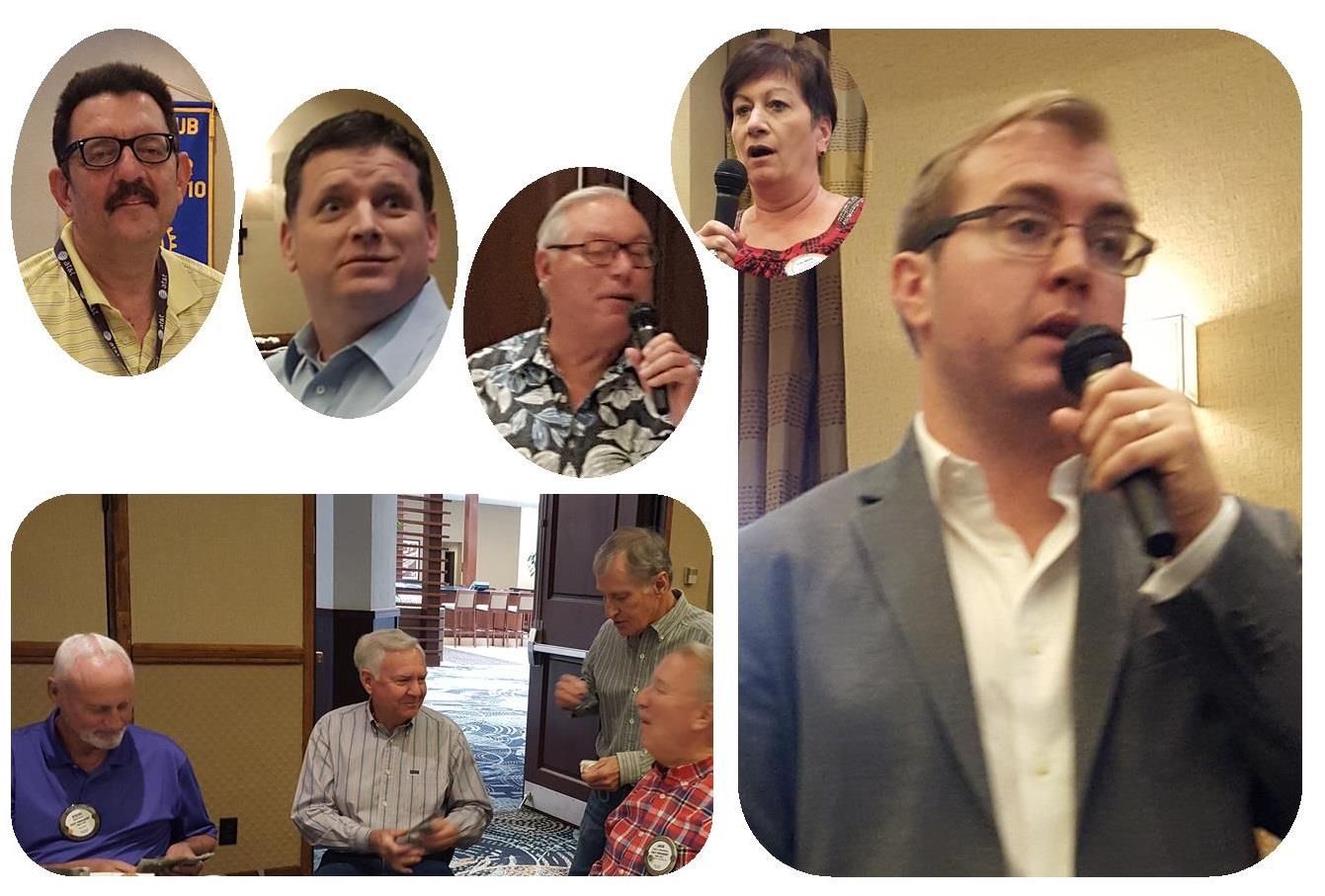 President-Elect Chris Krueger opened the meeting asking Jeanie Morgan to offer the invocation, followed by Pam Cohen leading the Pledge of Allegiance. Lucinda General served as greeter.
President-Elect Chris Krueger opened the meeting asking Jeanie Morgan to offer the invocation, followed by Pam Cohen leading the Pledge of Allegiance. Lucinda General served as greeter.Several guests were present. Among them were Tom, a retired fundraiser from Columbia Center, Washington; Carolyn Jones, Bob James, visiting from Calgary, Alberta, Canada; Joel Gratz, a software design consultant from Southern California; and Aaron Hult, in the mortgage industry, a guest of John Pennypacker.
Three badge numbers were drawn for the weekly attendance drawing with all three badge owners being absent, so the growing attendance drawing winnings will roll over to the April 12 meeting. The weekly raffle winners were three Rotarians who had pooled their funds. They split the $50 weekly winnings, but since they drew the Jack of Diamonds, the accumulated pot of $1,266 will continue to grow until a lucky weekly winner draws the Ace of Clubs.
Members were happy to have Chuck Flint back in attendance and happy he is recovering from his recent knee replacement surgery.
Pam Cohen paid happy dollars thanking Dan Coons for convincing Chuck to go ahead and have the surgery. Jack Rosenberg was happy he and Cindy would be celebrating their 10th wedding anniversary over the weekend. John Pennypacker paid happy bucks for getting to play golf recently with his 11-year-old grandson, who was the winner with a score of 79. John said the boy would be moving back further to tee-off in the future his game a bit more challenging and the possibility of grandpa winning a bit more attainable. Bob James announced that he would not see his Arizona Rotary friends again until next season as he was going to be headed back to Canada. Donna Goetzenberger announced she would be headed for RYLA over the weekend, and that her daughter, Emilee is on a 10-day trip with other Rotary Youth Exchange students in Italy. Greg Okanowski paid six happy dollars for his little boy's birthday.
Announcements:
- Club tree-planting project is coming up April 13-14. Rotarians wishing to help who have not already done so should CLICK HERE to contact Don LaBarge.
- Club Leadership Academy is coming up April 21. The Mesa West Board of Directors has authorized payment of the registration fee for any member wishing to attend. The content should be beneficial not only for Rotarians but for business and personal growth, as well. CLICK HERE to go to the registration site. You can indicate that you will pay by check. Send a copy of your registration to Pam Cohen or Aubrey Luma so they can coordinate payment to the district.
- April 25 at 5:30 PM, Mesa West Rotary will host their first Sponsor Appreciation Night at the Arizona Museum of Natural History. Members were reminded to make personal contact with any sponsors they personally solicited to encourage them to attend the event.
- Chris Krueger read a thank-you letter from the family of Craig Berge, thanking the club for our donation in his memory to the Child Crisis Center - a cause that was very dear to Craig.
- Dan Coons announced that our exchange student from Japan will finish his school year May 24, but will remain in Arizona through June 18, when he will depart on the train trip with other exchange students. Since proximity to his high school in Scottsdale will no longer be a necessity, Dan is looking for a Mesa West Rotary family that would enjoy the experience of hosting Takuma from May 24 through June 18. For more information, CLICK HERE to e-mail Dan.
- Saturday, May 5, our annual Spring Olympics will be held at the home of John and Jane Benedict.
Lucinda General became a fan of opera when she met and married Wayne. She introduced the speaker, Joshua Borths, Director of Education and stage director for the Arizona Opera.
As a boy, Joshua's goal was to be a stage director on Broadway. His father took him to the Cincinnati Opera. He became enthralled with the way music and story came together richly even though songs were sung in unfamiliar languages. Through education and opportunity, Joshua ended up with the Arizona Opera. He enjoys being able to reach 50,000 kids with a free exposure to opera through his roll as Director of Education. They have a touring company that participates in festivals. They have an opera book club. In all, with the education outreach and approximately 20,000 reached at the theater, they touch about 80,000 lives each year.
What most people would not be aware of, is that it is more difficult to get into the Arizona Opera studio than to get into Harvard Law. Vocal techniques go back to The Renaissance. The vocalists aspiring to the highly competitive program are all very well educated. In the opera, voices are not amplified with sound equipment. The vocalists are trained to project their beautiful voices enough to be heard over a orchestra with brass instruments. Female voices mature at about age 25. Male voices mature a bit later. In addition to the voice training, the artists linguistic skills in multiple languages are extremely important to interpret communicate the operatic story effectively. The life span of a voice can last into the 50's and in some cases beyond. Calcification is generally what deteriorates voices.
The process of putting a show together can take two years for a single two-week performance. If new, sets and costumes can be made in-house. Sometimes sets and or costumes are rented. Each new performing group brings fresh ideas and can make the story seem contemporary and relevant.
An interesting fact was that only twice in history were ticket sales enough to derive a profit from opera. That happened briefly in the 1640's and again in the 1830's. Ticket sales produce about 50-60% of the Arizona Opera revenue. The balance needed to operate comes from private donations and public and corporate grants. Performers in the productions are often a combination of studio and guest artists. Guest artists would be invited for a specific show when they are well known in particular roles and are willing to travel. The chorus and orchestra are typically local. Typically, the chorus is the name for the entire year, making the studio feel like a small community. When children are needed, they pull from local groups and local arts schools.
To promote a better community, those attending public education events are encouraged to bring items to support local food bank or other local charity as their cost of admission.
Next year's season will be interesting. We are in the middle of an operatic renaissance. More new operas are being written today than in any other prior period. Two new operas will be performed in the Herberger Theater in the coming season and the final three operas will be performed in Symphony Hall, including an American Masterpiece, Silent Night, which is about the Christmas Eve truce the British, French and German soldiers agreed to during World War I.
Those who attend the Arizona Opera are encouraged to arrive early for education and stay after for the "talk back" where performers talk about what went right and what went wrong during the performance.
There are various pricing options, some of which are reasonable for families to enjoy opera together. Go to ARIZONA OPERA for specific information and/or to donate.

